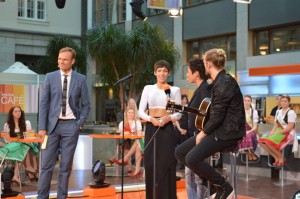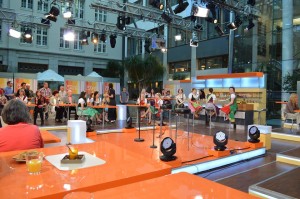by Johnie Freiwald
On their fourth day in Berlin, Point Park students and faculty visited the public television network Zweites Deustches Fernsehen or ZDF. They were awake bright and early to walk to the station with their tour guide because the day held something special: They were ready to be part of the studio audience of ZDF’s morning show, MoMa Café.
During the show the students experienced a live performance by Frida Gold, a German pop band. ZDF’s MoMa Café is a modern, trendy show similar to the United States’ “Good Morning America.” They regularly bring musical acts and guests that are well known by the young people in Germany to attract a youthful audience.
The hosts of MoMa Café frequently took time to speak with their studio audience. However, because the show is completely in German, most of the Point Park students were more or less in the dark for the entirety of the show. Despite the language barrier, MoMa Café has a similar format to many American morning news and talk shows with guests, musicians, video segments, games, and interruptions to present the weather or breaking news.
After the show, the group met with one of the show’s presenters or host, Wulf Schmiese. He spent most of his career as a hard-news journalist and had studied in the United States for a number of years during his time in university. Schmiese worked as a political correspondent for a Bonn newspaper in the early 2000s and then went on to be one of the founders of the newspaper Frankfurter Allgemeine. Then, in 2009, he left his longtime post as a political correspondent to cohost ZDF’s MoMa Café.
He explained that because ZDF is a public broadcasting system, and the one and only national television station in Germany, it does not have to worry about revenue. German residents must pay 16 euros a month to get this channel. “It’s a huge amount of money we get every year, billions of dollars,” he said. “For viewers, we mark it [pour programming] down to 16 cents for getting information and entertainment. Our show, I describe it as a salad. … the meat is the political stuff and the green and red stuff is the entertainment.
“It works well. It’s part of the democracy here. We’re like a newspaper. We’re like a magazine … a little bit of everything.”
Schmiese imparted his wisdom about broadcasting and ZDF to the Point Park students and a group of young Palestinian students studying international diplomacy who were also visiting Germany. He explained what journalism means to him: “You have to find the middle. You have to find a way that it is not too banal or too stupid for people who are informed and have an idea of what’s going on in Palestine or wherever. You can’t be too complicated just for the professors and have a lot of people saying ‘What is he talking about.’ So you really have to find the middle way.”
He prepares himself by reading voraciously and writing his own scripts. That helps his presentation of the information, something he said he is still working on and critiques continually. He develops four to five questions for his interview subjects on the show but still tries to be natural in his work.
Schmiese is also the producer and editor-in-chief for the show, and he said the planning process starts days ahead of the broadcast. The staff is flexible, though, for breaking news. “We work like a newspaper,” he said. “The team watches what happens overnight and we have a telephone conference at 8 a.m. for the next day’s work.
The students were able to take away the level of Schmiese’s experience and expertise as well as his love for his work. His past work as a correspondent – sometimes even joining the president, chancellor, and foreign minister on trips – as well as his current post as a successful morning show host helped him, he told the students.
Schmiese answered questions about German’s allegiance to Israel and the need to recognize Palestine as a nation from the diplomacy students, who wore commemorative T-shirts marking the exact anniversary of that day in 1948 that Palestinians were expelled from Israel and now still cannot return to Haifa.
“Germany has a special relationship with Israel. We don’t call Palestine a nation … but as a territory. We must be careful – as people may say you who killed the Jews. Germany is waiting for U.N. acceptance as Palestine as a state. It should be more of what your people want, not what your government wants,” he said. Schmiese noted that he had worked as a correspondent in the Middle East and had full knowledge of the difficulty of divided cities and nations as he responded.
. The Point Park students finished this informative and fun-filled visit with a group picture with Schmiese and their new Palestinian diplomacy student friends.

